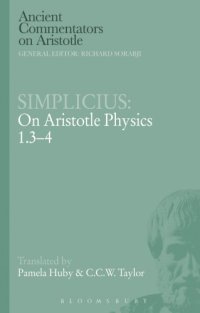
Ebook: On Aristotle Physics 1-3
Author: Themistius., Todd Robert B
- Tags: Physics, SCIENCE--Energy, SCIENCE--Mechanics--General, SCIENCE--Physics--General, Space and time, Electronic books, Early works, Aristotle. -- Physics. -- Book 1-3, Space and time -- Early works to 1800, Physics -- Early works to 1800, SCIENCE -- Energy, SCIENCE -- Mechanics -- General, SCIENCE -- Physics -- General, Physics (Aristotle)
- Series: Ancient commentators on Aristotle
- Year: 2012
- Publisher: Bristol Classical Press
- City: London
- Language: English
- pdf
The 15,000 pages of the ancient Greek commentators on Aristotle, written mainly between 200 and 600 AD, constitute the largest corpus of extant Greek philosophical writings not translated into English or other European languages. The works in question are not only invaluable as commentaries. They represent the classroom teaching of the Aristotelian and Neoplatonic schools in a crucial period during which pagan and Christian thought were reacting to each other. This series of translations draws attention to their high philosophical interest; but their significance extends far beyond the period in which most of them were written. They incorporate precious fragments of earlier Greek philosophy from the Presocratics onwards, and the subsequent history of Philosophy cannot be understood without them. Aquinas' reading of Aristotle was partly mediated by the commentators, who gradually transmuted Aristotle to make him agree with Plato and ended by turning his God into a Creator and so making him more acceptable to Christianity. In the time of Galileo the commentaries were seen as a repository of ideas alternative to Aristotle's which could be used in the new science of the Renaissance. The projected series, planned in some 100 volumes, fills an important gap in the history of European thought --Book Jacket.;Themistius' paraphrase of Books 1-3 of Aristotle's Physics shows this fourth-century AD commentator offering a characteristically focused recreation of Aristotle's treatment of a variety of topics ranging from his fundamental account of the principles underlying natural change in Book 1 to a challenging general theory of change in the opening chapters of Book 3. In addressing Book 2 Themistius deals with the theory of nature and natural causation, an associated analysis of events that are indirectly caused by chance or coincidence, and the perennially engaging issue of teleology vs. necessitation in nature. Finally, he deals with the concept of the infinite that Aristotle pioneered in the second part of Book 3. While heavily influenced by the content of the commentary on the Physics by Alexander of Aphrodisias, Themistius offers a methodologically innovative reconstruction mostly expressed in Aristotle's voice, more expansive than the original but focused on essentials. He also offers a notable digression on the subsequently influential theory of prime matter. His paraphrase opens a window on the continuing role of Aristotle in philosophical education in late antiquity and is an instructive contrast to the more expansive commentaries of Simplicius and Philoponus who drew heavily on this predecessor. It can also still be profitably consulted by scholars on matters of detailed interpretation and by students as an introductory guide to a major treatise. Robert B. Todd has previously translated for this series Themistius on Aristotle On the Soul, and Themistius on Aristotle Physics 4 and Physics 5-8.;Introduction -- Textual Emendations -- Translation -- Notes -- Bibliography -- English-Greek Glossary -- Greek-English Index -- Index of Passages Cited -- General Index
Download the book On Aristotle Physics 1-3 for free or read online
Continue reading on any device:

Last viewed books
Related books
{related-news}
Comments (0)